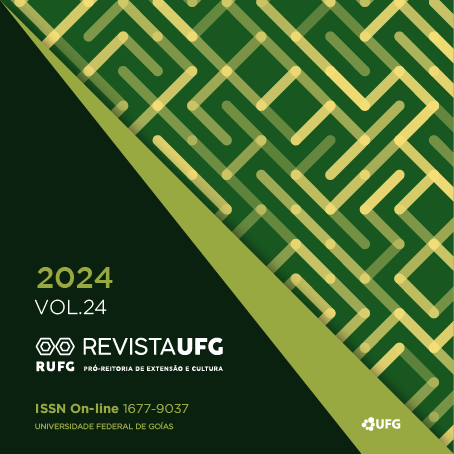(NON) INDIGENOUS SCHOOL EDUCATION:
the SPI, technical work, integration, and the agriculture of he Javaé people
DOI:
https://doi.org/10.5216/revufg.v24.80538Keywords:
Educação escolar. Povo Javaé. SPI. Trabalhos técnicos.Abstract
During the decades from 1930 to 1970, the Indian Protection Service – SPI sought to introduce school education among the Javaé people of Ilha do Bananal/TO through technical instructions aimed at the development of agricultural activities to convert their population into rural workers, integrating them into national society through work. This purpose was characteristic of the SPI's indigenous policy which, in a complementary way, denied the Javaé knowledge-building structure around agriculture to justify their presence on Bananal Island. The Javaé, however, were not passive agents in this intercultural process, they acted in an anti-colonial way, maintained their sacred relationship with agriculture, and lived with the indigenous posts of the SPI, Damiana da Cunha and Canoanã, installed, respectively, in the villages Barreira Branca and Canoanã, resisting the objectives of the municipality's indigenous policy. As sources, SPI reports consulted at the Indian Museum in Rio de Janeiro/RJ, historical sources available in the archive of the Prelacy of São Félix do Araguaia/MT, interviews with Javaé historical agents, and an anthropological report were used.
Downloads
Downloads
Published
Versions
- 2025-03-24 (3)
- 2025-03-10 (2)
- 2024-12-10 (1)
How to Cite
Issue
Section
License
Copyright (c) 2024 Revista UFG

This work is licensed under a Creative Commons Attribution 4.0 International License.
Revista UFG uses the Creative Commons CC-BY (4.0) - Attribution 4.0 International license for open access journals (Open Archives Initiative - OAI) as a basis for transferring rights.
Authors who publish in this journal agree to the following terms:
1) Authors may distribute, remix, adapt and build upon their work, even for commercial purposes, as long as they give UFG proper credit for the original creation. Authors may copy and redistribute the material in any medium or format.
2) Authors are allowed and encouraged to publish and distribute their work online (e.g., in institutional repositories or on their personal page) at any point before or during the editorial process, provided that reference is made to the place of publication origin, that is, the electronic address/reference of Revista UFG.
3) The authors of works published in Revista UFG are expressly responsible for their content.
4) All works submitted to Revista UFG that have images, photographs, figures in their body must be accompanied by a term of assignment of copyright of the author, of the participating member of the image and, in the case of children, of the relatives of the exposed children , with their data and signature.
Access the IMAGE USE AUTHORIZATION TERM document here.










